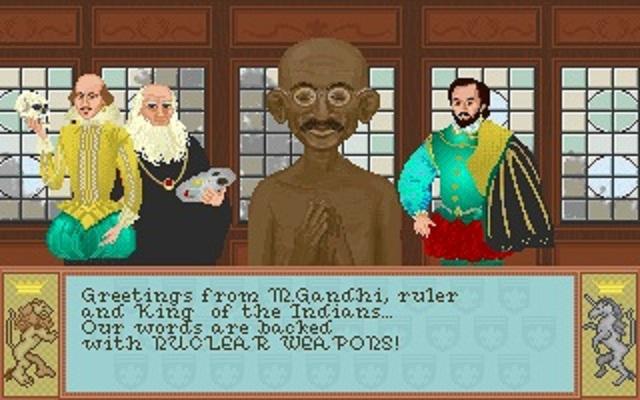Trigger and content warnings for self harm, sexism, sexual assault for both the film and this essay.
You wouldn’t guess it from looking at photos, but I laugh a lot.
A lot of things strike me as being funny — but it’s usually the incongruity of the situation that amuses me. Like the amazingly bad CGI in "Birdemic".
Not (just) because it is bad, but because it so clearly does not fit.
The way that Ghandi — at least, in Sid Meier’s Civilization games — nuked my country so many times… {1}
What is important here is that I’m not laughing at a person; at most, I’m laughing at a situation.
And that is part of the reason why I hate the patriarchy.
I have "gotten in trouble" with more than a few significant others due to my sense of humor, even when I’ve made sure to be painfully clear that I am not serious.
My childhood was steeped in late 20th century sitcoms. There are a lot of things which are extremely funny in a sitcom, and are absolutely horrific in real life. My brain routinely offers up sitcom-appropriate lines, whether I like it or not.
It’s not what I believe or think — they’re just what a sitcom writer would have someone say. And true to late 20th century sitcoms, they are often somewhat lewd, laced with innuendos and double-entendres.
Just saying these out loud would, appropriately, generate some … consequences. But I’d grin or laugh at what my brain served up, which led to others asking what was funny. So I started calling them "sitcom funny" when sharing them, so people knew I wasn’t serious.
That worked — at least, a little bit. Over time, more than one female-presenting person told me that the jokes, disclaimer and all, still made them feel uncomfortable.
They’d heard those same words too often by men who were being lewd, and who would react angrily if called out on it.
It’s the same reason why so many female-presenting people I know will ask "What’s wrong?" instead of "What’s up?" It’s the same reason I have to repeatedly reassure women that I am delighted by the way they speak, not mocking it. It’s the same reason I’ve had entire arguments that boiled down to "I’m not laughing at you; I laughed because it was surprising and unexpected."
It’s the same reason advocating for my own needs has come across as demands.
It’s the same reason why an ex made the absolutely reasonable assumption that my suicidal ideation was an attempt to manipulate her.
Because of men.
All men.
There are few ways for men to truly understand how this feels. We might intellectually get it, but that isn’t the same thing at all.
But the 2022 film "Men" comes close.
Harper, a young widow, fleeing an (initially) unknown personal tragedy, vacations in the British countryside at a charming off-brand AirB&B. Pretty quickly, things start to get strange, as we watch her interact with more and more men in the area, and how offputting they are to her. It gets stranger as we realize that she is only encountering men. And even stranger as we realize they are — at least to Harper — all the same man.
On one hand, Men is a painfully blunt film. When I realized that Rory Kinnear’s face was used for all the men in town, I actually muttered, "yes, all men, I know."
But it was not long after that when I snarled "You do not get to use my pain as your fucking excuse!" at the screen and had to pause the movie.
Because that dull, blunt horror of yes, every, single, fucking, man, every, single, time is the point.
It is all men.
Whether they’re aware of what they’re doing, whether they realize the harm they’re causing, that varies.
But that does not change that it is all men. Intended or not.
Including me.
There are two scenes in Men that really, really messed with me. (The clips are NSFW. You’ve been warned.)
In one, a preacher turns everything glorious and special and sacred and fun about sex into a twisted objectification, where she is to blame for his . The gory effect of a split hand flopping on the end of his arm didn’t bother me. The words, however, still makes me nauseated.
In the other scene, a husband tells his then-wife that if she leaves him, he will kill himself, and it will be her fault. It is emotional blackmail.
I’ve heard multiple accounts of other men saying this.
I’ve had others believe that is what I said {2}, because, well, that’s what usually is going on.
After all, that’s how we were taught to behave.
Most Gen X’ers had a moment when they realized exactly how toxic the lyrics of The Police’s biggest hits can be. "Don’t Stand So Close To Me" with its age and power differential is the most obvious, but the stalkery themes of "Every Step You Take" seem to be celebrated at wedding receptions.
I was really into the band when I was in middle school. Once, I stayed up late at night to hear a live call-in interview on a radio talk show. I dialed and dialed for the whole hour, never getting through.
I wanted to have a chance to speak to Sting. To tell him how much his lyrics resonated with me.
It’s probable that those lyrics had a lot to do with why I wrote something suicidal in a letter to my crush at the time."Can’t Stand Losing You" — with the lyrics "You can call it lack of confidence/But to carry on living, doesn’t make no sense" — was also on that Greatest Hits cassette. {3}
I wasn’t suicidal, I’m pretty sure of that. I thought that feeling — those words — was what it meant to have strong feelings for someone. I thought that — along with big gestures like holding up boomboxes in the rain and low-tech slideshows with posterboard — was what you did to show you cared about someone. {4}
I don’t actually remember what I wrote in that letter. I only remembered it happened after starting to write this.
I bet she remembers, though.
I bet it had a hell of a negative effect, whether I meant for it to or not.
And that is why, fellow male, I challenge you to watch Men.
There are missing stairs; people that a whisper network warns family members and friends to avoid. To not leave them alone with the children. To not get refreshments when they’re in the concession area.
And it is important for us, as men, to amplify those warnings. To lend our privilege. To hold other men accountable. To point out when their pranks are really just weaponized intimidation or "just catcalling".
But it is even more important for us to hold ourselves accountable.
It’s easy for us men to think of the times we’ve behaved badly as exceptions. As something notable and unusual.
But for the women on the receiving end of that behavior, it is only a day of the week that ends in "y".
Men brings that home in a visceral, deeply disturbing way, from the first scene all the way to Harper’s weariness at her dead husband’s confession at the end of the film.
It’s easy to just look at other men as being the problem.
After all, they are.
For example, J.B. has raped at least three women that I know about. At least once, he woke her up by fucking her, because she told him "not tonight", so he figured that meant in the morning was fine. Another, he just assumed he had the right to her because of their relationship. He wasn’t alone there; A.W. also repeatedly raped his spouse, and there’s those assholes who will claim it isn’t "rape" because they’re married. R.U. has raped at least one woman when the mix of cold meds and booze left her incapacitated. Both S.Z. and J.S. have stalked women while having a position of authority and power over them. {5}
That’s just some of the examples that people have shared with me. {6}
Calling out that bad behavior of other men is important. Lending our voices, our privilege to calling out other men is vital. It is necessary. After all, we still live in a world where "misogynistic rapist" is not the default language for describing "grab ’em by the pussy" Trump.
But that is the easy part.
That is only the most-awful tip of the iceberg.
The harder part is calling out ourselves, and being honest about the damage we each have done.
Of having the courage to face what we have done. To understand that it is not just those obviously "bad" men. That it is all of us men.
To try to fully understand it in a visceral way.
And Men is definitely a place to start.
If you’re brave enough.
{1} Though this is was not an intended outcome.
{2} More than once, with both situations.
{3} The lyrics actually explicitly continue: "And you’ll be sorry when I’m dead/And all this guilt will be on your head," so, yeah.
{4} You still see it with people who mistake expressions of jealousy for gestures of love. You still see it with people who mistake expressions of jealousy for gestures of love.
{5} If you’d like to out yourself as the person with those initials, go right ahead, asshole.
{6} Don’t give me any false accusation whining.


